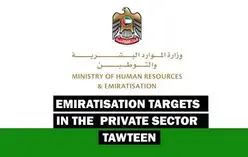Introduction
Tawteen, or Emiratisation, is a strategic initiative by the United Arab Emirates (UAE) aimed at increasing the participation of Emirati nationals in the private sector workforce. This initiative is crucial for ensuring that Emiratis contribute significantly to the nation’s economic development. This article provides an in-depth look at the rules, regulations, and requirements associated with Tawteen, along with frequently asked questions (FAQs).

Rules and Regulations
- Mandatory Quotas:
- Companies in specific sectors are required to meet mandatory quotas for Emirati employees.
- Quotas vary depending on the sector and the size of the company.
- Priority Employment:
- Priority is given to Emirati nationals for job vacancies.
- Companies are encouraged to create job opportunities that align with the skills of Emiratis.
- Training and Development:
- Companies must provide training and development programs to equip Emirati employees with necessary skills.
- Government support and incentives are available for training initiatives.
- Compliance and Monitoring:
- The Ministry of Human Resources and Emiratisation (MOHRE) monitors compliance with Tawteen regulations.
- Non-compliant companies may face penalties, including fines and hiring restrictions for expatriates.
- Incentives for Employers:
- Companies meeting or exceeding Tawteen quotas may receive benefits such as reduced visa fees and priority in government contracts.
- Financial incentives and grants are available for companies investing in Emirati employee training.
Requirements
- Registration:
- Companies must register with the Tawteen program through MOHRE.
- Regular updates and reports on Emirati employment status are required.
- Job Advertisements:
- Job vacancies must be advertised to Emiratis before being offered to expatriates.
- MOHRE provides platforms for posting job advertisements targeted at Emiratis.
- Employment Contracts:
- Contracts for Emirati nationals must comply with UAE labor laws and regulations.
- Contracts should clearly outline job roles, responsibilities, salary, and benefits.
- Reporting and Documentation:
- Regular reporting on Emiratization efforts is mandatory.
- Documentation of training programs and development plans must be maintained and submitted to MOHRE.
Related eServices
- Nafis Platform:
- Job vacancies and training programs can be searched through the Nafis platform.
- Nafis implements national initiatives to increase Emiratisation in the private sector, supporting citizens by enhancing their competitiveness.
- Reporting Violations:
- False Emiratisation or other violations can be reported through the relevant eServices provided by MOHRE.
Emiratisation Targets in the Private Sector
- Nafis Council:
- The Emirati Human Resources Competitiveness Council, Nafis, aims to get 75,000 Emiratis into the private sector over the next five years.
- The council supports various initiatives to empower Emirati talent and motivate private companies to attract Emirati employees.
- Rate of Emiratisation:
- The Cabinet approved a decision to raise Emiratisation rates by 2% annually for skilled jobs in private sector establishments with 50 or more employees, aiming for a 10% increase by 2026.
- Non-compliant companies must pay AED 6,000 monthly for every citizen not employed, with the amount increasing annually by AED 1,000 until 2026.
- Expansion of Targets:
- Starting in 2024, companies with 20 to 49 employees must hire at least one UAE citizen, and at least two by 2025. Non-compliance will result in financial contributions to the government.
- Specific Sectors:
- Sectors such as information and communications, financial activities, healthcare, education, and hospitality services have higher Emiratisation targets.
Compliance with Emiratisation Regulations
- Advertising Rules:
- Jobs must not be misleading and should represent genuine opportunities.
- Advertisements should not refer to government policies or benefits without MOHRE’s prior permission.
- Employer Obligations:
- Employers must provide appropriate workplace tools, on-the-job training, obtain work permits, conclude employment contracts, pay salaries according to the Wages Protection System, and register Emiratis in the pensions and social security system.
- Penalties and Fines:
- Companies bypassing Emiratisation targets may face penalties, including fines and administrative actions as outlined in Cabinet Resolution No. 95 of 2022.
FAQs
Q1: What is the main objective of the Tawteen initiative?
- The main objective is to increase the participation of Emirati nationals in the private sector and reduce reliance on expatriate labor.
Q2: Are all companies required to comply with Tawteen regulations?
- Compliance requirements vary by sector and company size, with specific sectors having stricter regulations.
Q3: What incentives are available for companies that comply with Tawteen regulations?
- Incentives include reduced visa fees, priority in government contracts, financial grants, and support for training programs.
Q4: How can companies register for the Tawteen program?
- Companies can register through MOHRE’s online portal and submit regular updates and reports on their Emiratisation efforts.
Q5: What happens if a company does not comply with Tawteen regulations?
- Non-compliant companies may face penalties such as fines, hiring restrictions for expatriates, and potential blacklisting from government contracts.
Q6: What types of training programs are recognized under Tawteen?
- Training programs should focus on skill development and career advancement, aligned with job market demands, with guidelines and support provided by MOHRE.
Q7: Can expatriates still be hired in companies participating in Tawteen?
- Yes, but companies must prioritize Emiratis for job vacancies and meet their Tawteen quotas before considering expatriate candidates.
Q8: Are there specific sectors with higher Tawteen quotas?
- Yes, sectors like banking, insurance, telecommunications, and healthcare have higher quotas due to their potential for employing Emiratis.
Q9: What support does the government provide for Tawteen?
- The government offers financial incentives, training support, and platforms for job advertising to assist companies in meeting Tawteen targets.
Q10: How is compliance with Tawteen monitored?
- MOHRE monitors compliance through regular reports, audits, and inspections. Companies must maintain accurate documentation of their Emiratisation efforts.
Conclusion
Tawteen is a crucial initiative for the UAE’s economic and social development, ensuring that Emirati nationals are well-represented in the private sector workforce. By adhering to the rules, regulations, and requirements of Tawteen, companies not only contribute to national goals but also benefit from various incentives and support provided by the government.
You should read this also: Updated List of Professions in the UAE









